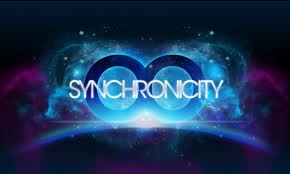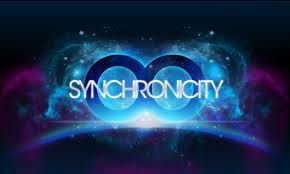 Chance often plays a key part in our lives. In fact, it’s how we got here.
Chance often plays a key part in our lives. In fact, it’s how we got here.
It also sometimes saves our lives. I’ve come close several times, escaping only by a hair.
You might even say chance rules our lives, determining where we’re born, the culture that shapes our behaviors and beliefs, friends we make, and our life mates.
On occasion, I find myself asking What ifs. What if I had chosen to do that instead of this? Frost wrote a famous poem about it called “The Road not Taken” with its telling rejoinder, “And that has made all the difference.”
In short, chance has this mysterious aspect to it, a sense that it’s more than randomness or simple caprice; that just maybe it’s the work of an entity transcending both ourselves and nature. This is especially true when coincidence, a kind of sub-species of chance, occurs. The famous Swiss psychiatrist, Carl Jung, thought so and called it synchronicity, a way of happening whose effects are to be associated with meaning rather than cause. Jung wasn’t alone here, as Arthur Koestler gave it prominence in his compelling, The Roots of Coincidence.
All of us can probably recount those odd, inexplicable intrusions of coincidence in our lives; for example, you’ve just been thinking about someone you’ve lost connection with and, lo and behold, there they are.
Or you and your spouse suddenly come out with the same word or phrase. When my wife and I were first dating we both simultaneously blurted out “deciduous” on that one autumn day graced with beauty.
Coincidence, or synchronicity elements tend to fall into the two categories of time and space. Those I just gave deal with convergency in a temporal way. Those of space, on the other hand, deal with place. For instance, years ago, I was changing trains for Vienna in a small German town, Fūssen, when a woman with an American accent came up to me asking if I spoke English, as she needed train information. As we talked she asked where I was from, and I told her Kentucky. She then inquired if I had ever heard of Wilmore. She had a sister teaching at Asbury University. It so happened that I lived in Wilmore and was teaching at the same university. And all of this in a remote station in a foreign land. For most of us, that kind of synchronicity is hard to explain away as simple coincidence. and we remember it always.
The most remarkable occurrence of coincidence, however, happened when I was in India many years ago. Taking advantage of the several hour layover in Frankfurt, Germany, I wandered into the airport bookstore and ultimately purchased Erich Fromm’s To Have Or To Be. I didn’t suspect the rebound of this choice with its brilliant critique of Man’s insatiable penchant for acquisition that conversely preys on his well-being. A few days later, I was at a tiger sanctuary in India, having supper at a long table with mostly Aussies and a fair sprinkling of Europeans, when across from me sat this Swiss couple talking about Fromm’s book! Now mind you, this wasn’t exactly a hot, top ten item out of the NYT’s listing. A densely written book about economics, most people wouldn’t bother, and yet here this couple was into it. And then there was the oddity that had I been just a few places down the table, I’d have missed all of this.
Coincidence didn’t stop there, however, as three weeks later there I was sitting in the Bombay (as it used to be called) airport waiting for my flight to Germany, and took out my Fromm again to pass the time. Nearby sat the crew of an Air France flight waiting to board their plane to Paris. Out of the blue, this beautiful French flight attendant got up and sat down beside me. She told me she had been reading this book recently, too. No sooner were the words out of her mouth, and she was whisked away as the call came to board.
How can something so unlikely like this even happen? To this day, I can’t explain it. At the time, I thought there might be some message being sent me from above, a signal if you will. Jung, whom ironically I would take up in serious study just a few years later, held that it was important to be sensitive to such moments as they hinted at a higher reality transcending the causal that can only be perceived intuitively.
I suppose you can resort to the law of higher numbers to explain such phenomena; for example, the more people in a room above 25, the more likely you’ll find two of them sharing the same birthday.
This is why many scientist believe there exist other worlds among the myriad galaxies that populate the universe. Sooner or later, the unlikely proves probable, given the high numbers.
Still, this law of numbers seems incongruous to me in unraveling my Indian moment as I really don’t fly that much, or read Fromm-like books frequently, or am into making myriad connections with others, or simply encountering a stimulating focus that filters out competing dissonance.
One thing I do know is that life with its quirks can sometimes prove stranger than fiction, which of course makes it all the more interesting.
Do well. Be well,
rj


I am now not sure the place you are getting your information, however great topic.
I must spend some time learning more or working out more.
Thanks for great information I was on the lookout for
this info for my mission.
LikeLike
What’s up everyone, it’s my first pay a visit at this site, and piece of writing
is really fruitful designed for me, keep up posting these types of articles or reviews.
LikeLike
…’sorry ’bout mi typos earlier; here’s a slightly improved response:
THANKS for more thought-provoking stuff, Ralph, …on what some call coincidence, miracle, serendipity, chance, plan, etc.. As a [supposed] artist-thinker and would-be maker of ‘sensate meaning,’ I like ‘bending’ implications of work that people like Cohen did , in southern Cali – in the late seventies. They called it ‘systems abstraction’; the process seemed to mimic[sic.] the fascination among then-contemporary systems-based music composers, who created a ‘system’ that would guarantee randomness and yet something ‘humanly compelling.’ I assume there was a powerful if subterainian[sic.] agnostic motive here. I say I like to ‘bend’ implications of this direction because I seem to want to make things [and talk of made things] in such a way as to suggest an incredibly imaginative making that is yet reception, discovery. I call it ‘shell-finding’; it seems uniquely responsive/relational/reactive. Herein, I seem to want to ‘amen’ the Thomist attitude about how ‘the greatest creativity is no more or less than the greatest response.’ (See Murphy’s CHRIST, THE FORM OF BEAUTY – largely on Southern/agrarian lit.) In this kind of process, all kinds of ‘serendipities’ seem to emerge. … ‘certainly nothing decisive here, of course – only another set of foils, ultimately, for ‘the discerning of what one would’ – (of all things, no clear ‘proof’ or ‘demonstration’ -either way). For many complex reasons, many will ‘witness mere chance coincidence’ and proclaim it as pure miracle; an [apparent] equal amount of persons will ‘witness a miracle’ and [apply their received freedom to] discern pure coincidental circumstance. I often tend to ‘split the difference’; in doing so, I may glimpse a compelling sense of the ‘intimate beyond’ (AND its insistence on freedom, non-compunction, and Relation. Neither ‘pure determining’ nor ‘pure randomness’ seem big enough for the Real or its experience/s.
________________________________
LikeLike